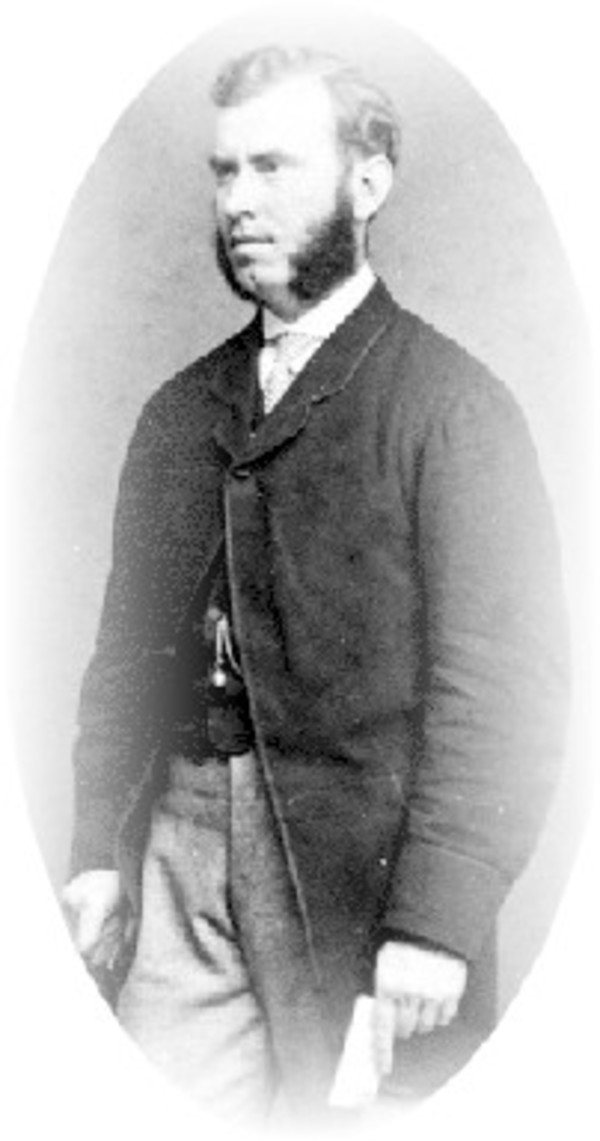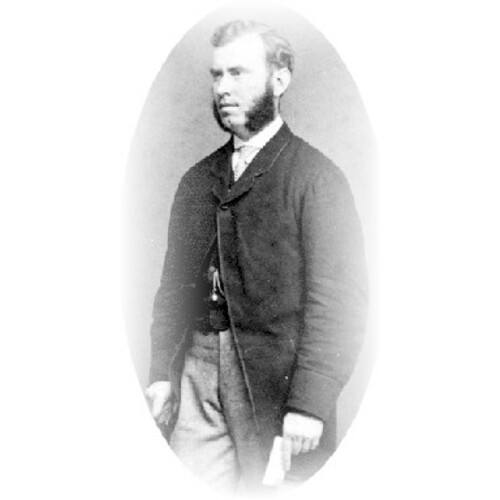
Source: Link
ALSTON, EDWARD GRAHAM, lawyer and public servant; b. 6 Sept. 1832 at Cambridge, England, second son of the Reverend George Alston and Anne Charlotte Oxenden; m. at Victoria on 2 Sept. 1861 Elizabeth Caroline Abbott (d. 1865) by whom he had two children, and on 6 Feb. 1867 Anna Maria Tuzo by whom he had three children; d. 12 Nov. 1872 at Freetown, Sierra Leone.
Edward Graham Alston was educated at St Paul’s School, London, and Trinity College, Cambridge (ba, 1855), and was called to the bar at Lincoln’s Inn in 1857. Arriving in Victoria by way of the Panama on 26 May 1859, he was admitted to the bar of Vancouver Island on 15 June 1859 and on 14 Feb. 1861 was appointed registrar of titles for Vancouver Island, a position he held until 1 June 1870, when he became registrar general of the united Colony of British Columbia. He was one of three commissioners who drew up the Consolidated statutes of British Columbia (Victoria, 1870) and he acted as attorney general from 12 May to 23 Aug. 1871, during which period British Columbia officially entered confederation.
Alston was a member of the Legislative Council of Vancouver Island, 1861–62; a commissioner of the Indian reserve and a member of the General Board of Education of Vancouver Island, he resigned these offices in 1865, when after the death of his first wife he went to England for a year. Following his return he was appointed a member of the Legislative Council of British Columbia, 1868–71; justice of the peace (3 Dec. 1868); commissioner of savings banks (15 April 1869); registrar of joint stock companies (26 Aug. 1869); and inspector general of schools (6 May 1870).
Outside his official duties Alston took an active interest in community affairs. A member of the Church of England, he was appointed registrar of the diocese in 1866 and he contributed an “Historical and political summary for . . . 1858–1868” to the Report of the Columbia Mission for 1868. He held office in the Mechanics’ Literary Institute and as a freemason was the prime mover in establishing the benevolent fund of the Victoria Lodge no. 1085, A.F. & A.M. During the Fenian scare of 1866 he was “idiot enough to join the corps [Vancouver Island Volunteer Rifles] & go into camp & sleep out & make myself very juvenile & foolish.” In 1868 he accompanied the expedition which crossed Vancouver Island from Nootka Sound to the east coast, a region whose exploration had been left unfinished by Dr Robert Brown*’s party in 1864; “Mount Alston” at the head of the Nimpkish River still commemorates his journey. In the 1870 edition of the Hand-book to British Columbia and Vancouver Island Alston himself comments on this 1868 expedition and affirms his belief that “this colony, with its latent wealth and splendid climate, has a rich – though it may be distant – future before it . . . .”
In this future, however rich, Alston himself had no wish to share. He was quite out of sympathy with the growing trend in British Columbia toward a more democratic form of government. When the colonies were united in 1866 he was privately delighted to have “got rid of the House of Apes” on Vancouver Island, and when the united colony joined confederation in 1871 he asked the imperial government for a transfer since he could see “no hope of preferment within the Colony, inasmuch as a Responsible form of Government has been established, in which all vacancies will be filled by the political friends of the ministry of the day.” A month after British Columbia had officially become a province of Canada, Alston left Victoria to take up his appointment as queen’s advocate in Sierra Leone where his career was cut short by African fever the following year. Evidently, as his son said, Alston found himself “more at home” in a colony like Sierra Leone where he was a member of the Legislative and Executive Councils and served as acting governor, and where the local newspaper bore witness that “his abilities and high character gave him a foremost place in the staff of officials.”
PABC, Alfred Edward Alston papers; Edward Graham Alston correspondence, 1860–71; diary, 1859–60, 1865; Crease papers, correspondence inward, 1862–70. E. G. Alston, “Historical and political summary for ten years – 1858–1868,” in Report of the Columbia Mission, 1868 (London, 1869) and reprinted in E. G. Alston, A hand-book to British Columbia and Vancouver Island . . . (London, 1870), 3–5. British Columbia, Blue Books, 1859–70 (copies in PABC); Legislative Council, Journals, 1868–71. British Columbia Government Gazette (Victoria), 1871. Colonist (Victoria), 1859–68. Gazette (Victoria), 1858–72. Government Gazette (New Westminster and Victoria), 1868–70. Negro (Freetown, Sierra Leone), 20 Nov. 1872. Victoria Daily Standard, 23 Aug. 1871. Alumni Cantabrigienses . . . , comp. John Venn . . . and J. A. Venn, pt.2, I (Cambridge, 1940), 47. S. D. Scott, “The attitude of the colonial governors and officials towards confederation,” in British Columbia & confederation, ed. W. G. Shelton (Victoria, 1967), 143–64.
Cite This Article
Dorothy Blakey Smith, “ALSTON, EDWARD GRAHAM,” in Dictionary of Canadian Biography, vol. 10, University of Toronto/Université Laval, 2003–, accessed February 20, 2026, https://www.biographi.ca/en/bio/alston_edward_graham_10E.html.
The citation above shows the format for footnotes and endnotes according to the Chicago manual of style (16th edition). Information to be used in other citation formats:
| Permalink: | https://www.biographi.ca/en/bio/alston_edward_graham_10E.html |
| Author of Article: | Dorothy Blakey Smith |
| Title of Article: | ALSTON, EDWARD GRAHAM |
| Publication Name: | Dictionary of Canadian Biography, vol. 10 |
| Publisher: | University of Toronto/Université Laval |
| Year of publication: | 1972 |
| Year of revision: | 1972 |
| Access Date: | February 20, 2026 |



